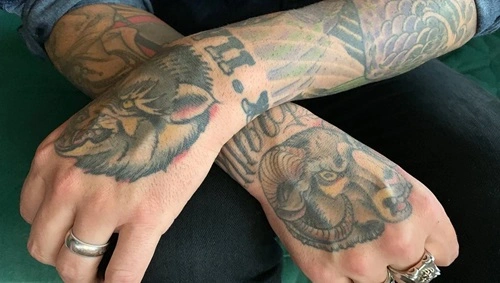Tattoos have evolved from being a mark of cultural significance to a popular form of self-expression worldwide. A permanent tattoo involves embedding ink into the dermis layer of the skin, creating a design that lasts a lifetime. While the idea of eternal artwork on your body may seem fascinating, it comes with its share of benefits and drawbacks. Here’s an in-depth look at the advantages and disadvantages of getting a permanent tattoo.
Advantages of Permanent Tattoos

1. A Unique Form of Self-Expression
Permanent tattoos allow individuals to express their identity, beliefs, and emotions creatively. Whether it’s a symbol of love, a tribute to a loved one, or a depiction of personal values, tattoos often hold deep meanings for those who wear them. They provide a canvas to narrate stories or display individuality in a world that values authenticity.
2. Durability
One of the most significant advantages of a permanent tattoo is its longevity. Unlike temporary tattoos that fade after a few days, permanent tattoos last for a lifetime (barring any laser removal procedures). This durability ensures that your chosen artwork stays with you as a constant reminder of what it represents.
3. Artistic Value
Tattoos are a form of wearable art. Professional tattoo artists bring their creativity to life through intricate designs, using the human body as a canvas. For art enthusiasts, this is a way to carry a masterpiece everywhere they go.
4. Cultural and Personal Significance
In many cultures, tattoos symbolize rites of passage, spiritual beliefs, or social status. For some, getting a tattoo can be a way of connecting with their heritage or preserving traditions. On a personal level, tattoos often commemorate milestones, such as birthdays, anniversaries, or achievements.
5. A Confidence Booster
For some individuals, tattoos can boost self-esteem. A well-thought-out tattoo can enhance one’s body image, making the wearer feel more confident and empowered. Covering scars or imperfections with tattoos is also a common practice that contributes to this positive feeling.
6. Memorialization
Tattoos often serve as a way to honor loved ones who have passed away. A tattoo can act as a constant source of comfort and a reminder of special memories. Memorial tattoos are deeply emotional and are a tribute that lasts forever.
Disadvantages of Permanent Tattoos
1. Irreversibility
The permanence of tattoos, which is an advantage, can also be a significant disadvantage. Tastes, preferences, and personal beliefs evolve over time. A tattoo that seemed meaningful at one point might lose its relevance or appeal later in life. Removing a tattoo is a complicated and expensive process, involving laser treatments that can be painful and may leave scars.
2. Health Risks
Tattoos involve puncturing the skin with needles, which comes with potential health risks. Some of the common issues include:
- Infections: Improper hygiene during the tattooing process can lead to bacterial or viral infections.
- Allergic Reactions: Some individuals may be allergic to tattoo ink, causing redness, swelling, or itching.
- Skin Irritations: Tattoos can sometimes trigger chronic skin conditions or inflammations, particularly in individuals with sensitive skin.
3. Social and Professional Stigma
While tattoos are more widely accepted today, they can still carry a stigma in certain social or professional circles. Some industries, especially traditional or conservative ones, may view tattoos negatively, potentially affecting job prospects or promotions. It’s essential to consider your career aspirations and societal norms before getting a visible tattoo.
4. Pain During the Process
Tattooing is not a painless procedure. The level of pain depends on factors such as the tattoo’s size, location, and your pain threshold. Areas with thinner skin or closer to the bone, such as the ribs, wrists, or ankles, tend to be more painful. For individuals with low pain tolerance, this can be a deterrent.
5. Cost
High-quality tattoos by professional artists come with a hefty price tag. Additionally, larger and more intricate designs require multiple sessions, increasing the overall cost. Attempting to save money by choosing a less experienced artist can compromise the quality and safety of the tattoo.
6. Potential for Regret
Tattoo regret is a real phenomenon. Impulse decisions, relationship-related tattoos, or poorly executed designs are common reasons for dissatisfaction. While tattoo removal options exist, they are expensive, time-consuming, and often leave behind scars.
7. Fading and Maintenance
Over time, tattoos can fade due to exposure to sunlight, aging, and improper aftercare. Maintaining the vibrancy of a tattoo requires diligent care, such as applying sunscreen and using moisturizers. Touch-up sessions may also be necessary, which can add to the overall cost and effort.
8. Allergic Reactions and Long-Term Effects
Certain tattoo inks, especially those with red, green, or yellow pigments, are more likely to cause allergic reactions. Additionally, some inks contain heavy metals or toxic substances that may pose long-term health risks, though more research is needed in this area.
Tips for a Positive Tattoo Experience
If you’ve decided to get a permanent tattoo, here are some tips to minimize disadvantages and enhance the experience:
- Choose a Reputable Tattoo Artist: Research artists who are licensed, experienced, and have positive reviews. Visit the studio beforehand to ensure proper hygiene standards are maintained.
- Think Long-Term: Avoid impulsive decisions. Take time to select a design that resonates with you deeply and is likely to remain relevant throughout your life.
- Mind the Placement: Consider the visibility of the tattoo. Opt for placements that align with your lifestyle and professional aspirations.
- Aftercare is Crucial: Follow the aftercare instructions provided by your tattoo artist. Keep the area clean, moisturized, and protected from direct sunlight to ensure proper healing.
- Know Your Allergies: If you have sensitive skin or known allergies, consult a dermatologist before getting a tattoo. Test a small patch of ink on your skin to rule out adverse reactions.
Conclusion
Permanent tattoos are a beautiful and meaningful way to express individuality, commemorate special moments, and embrace art. However, they come with certain risks and considerations. It’s important to weigh the advantages and disadvantages carefully before committing to a permanent design.
By choosing a skilled artist, prioritizing hygiene, and considering long-term implications, you can minimize risks and ensure that your tattoo remains a source of pride and joy for years to come. Whether it’s a symbol of your beliefs, a tribute to a loved one, or an artistic masterpiece, a tattoo can be a lasting testament to who you are and what you value.

